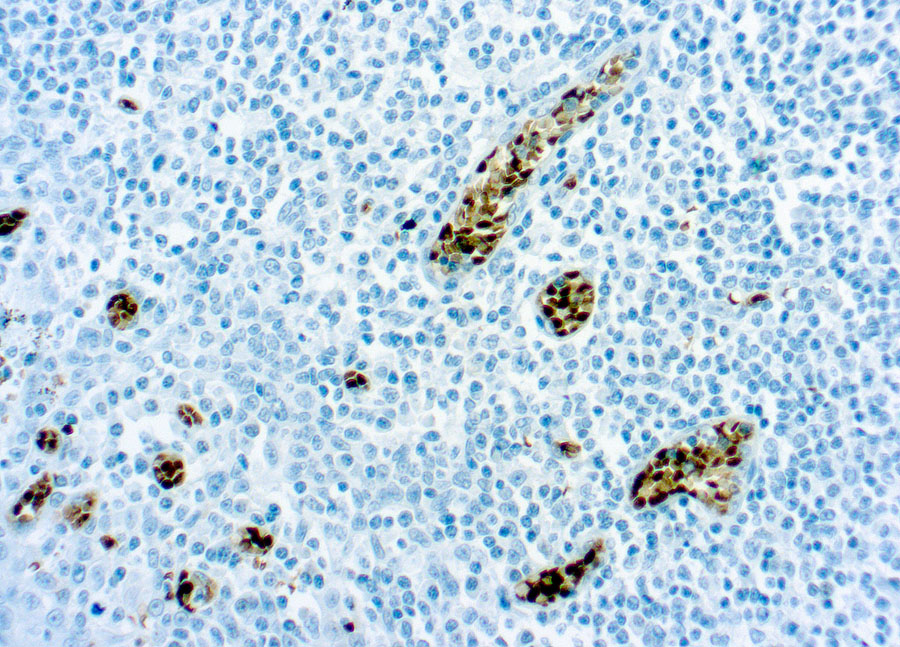Antibody (Suitable for clinical applications)
| Specification | Recommendation |
|---|---|
| Recommended Dilution (Conc) | 1:10-1:20 |
| Pretreatment | Citrate Buffer pH 6.0 |
| Incubation Parameters | 30 min at Room Temperature |
Prior to use, inspect vial for the presence of any precipitate or other unusual physical properties. These can indicate that the antibody has degraded and is no longer suitable for patient samples. Please run positive and negative controls simultaneously with all patient samples to account and control for errors in laboratory procedure. Use of methods or materials not recommended by enQuire Bio including change to dilution range and detection system should be routinely validated by the user.
O-Methylguanine-DNA-Methyltransferase Information for Pathologists
Summary:
O6-methylguanine-DNA methyltransferase, a DNA repair enzyme at 10q26. Removes DNA alkylation adducts from mutagenic O(6)-methylguanine, which both:. Repairs damaged DNA and protects normal cells from carcinogens, and. Contributes to drug resistance of gliomas to alkylating agents by protecting tumor cells from alkylating agents such as temozolomide. MGMT promoter hypermethylation and epigenetic silencing often occur as early events in carcinogenesis.
Notable Clinical Features:
General. Polymorphisms in MGMT gene may be cancer risk factor (Tumour Biol 2013;34:3227). CNS, diffuse glioma and glioblastoma:. Methylation of promoter region of MGMT is associated with favorable outcome in glioblastoma patients undergoing chemotherapy with alkylating agents (median survival 22 months with versus 13 months without methylated promoter) (Onco Targets Ther 2013;6:1363). Methylation may not have favorable outcome in glioblastoma patients >50 years of age (Mod Pathol 2013;26:922), although recommended to consider use of temozolamide in elderly regardless of MGMT status (Clin Neurol Neurosurg 2013;115:1375, PLoS One 2013;8:e74242).
Common Uses By Pathologists:
Methylation status may be useful to oncologists planning treatment . Microscopic (histologic) images Images hosted on other servers:. Missing Image. Hepatocellular carcinoma with HIV (fig A / B).
| O-Methylguanine-DNA-Methyltransferase General Information | |
|---|---|
| Alternate Names | |
| Molecular Weight | |
| 21.6 kDa | |
| Chromosomal Location | |
| q26.3 [chr: 10] [chr_start: 129467190] [chr_end: 129770983] [strand: 1] | |
| Curated Database and Bioinformatic Data | |
| Gene Symbol | MGMT |
| Entrez Gene ID | 4255 |
| RefSeq Protein Accession(s) | XP_005252739; NP_002403 |
| RefSeq mRNA Accession(s) | XM_005252682; XM_017016275; NM_002412 |
| RefSeq Genomic Accession(s) | NC_000010; NG_052673 |
| UniProt ID(s) | P16455 |
| KEGG Gene ID(s) | hsa:4255 |
| General Description of O-Methylguanine-DNA-Methyltransferase . | |
| O(6)-methylguanine-DNA-methyltransferase (MGMT) is a 22 kDa human DNA repair protein that removes O(6)-alkylguanine DNA adducts. MGMT acts as a suicide acceptor protein repairing the DNA by accepting alkyl groups and consequently inactivating itself. This antibody stains all mantle zone lymphocytes and 50% of germinal center lymphocytes. Basaloid epithelial cells of tonsil squamous mucosa are also stained positive with this antibody. | |




Reviews
There are no reviews yet.